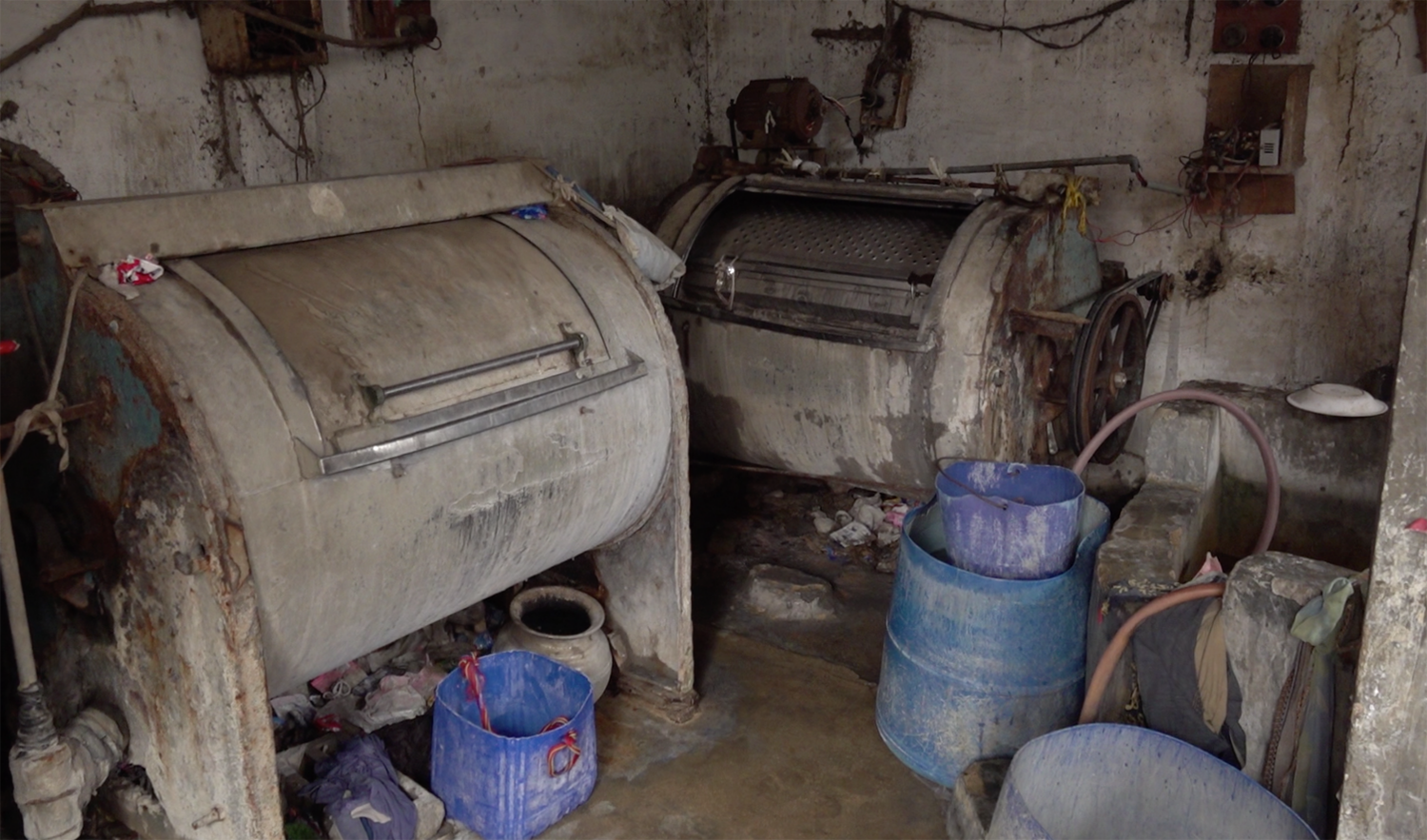KARACHI: Muhammad Imran was six years old when he started accompanying his parents door to door to collect dirty clothes and take them to a dhobi ghat, or open-air laundry, in Karachi’s old Lines Area.
Imran, now 50, is one of thousands of people in the port city who followed their parents into a life of dunking, thrashing and drying hundreds of items of clothing each day for a few rupees per piece. Today, the profession he has been associated with his whole life is facing an inevitable decline as more and more households use machines or employ domestic staff to do their washing at home.
But before this downfall, dhobi ghats had been an integral part of South Asian culture for centuries. In Karachi, the largest one used to be the Juna Dhobi Ghat along the banks of the Lyari River, a chaotic conglomeration of rows of open-air concrete wash pens, each with its own flogging stone and rooms where the “dhobis” worked and lived. Once known as the largest ghat in Asia, Juna is now a much smaller space primarily used for drying clothes. During its heyday, the Mahalaxmi dhobi ghat in India’s Mumbai - first built in 1890 and considered the world’s largest open-air laundry system - saw around 7,000 dhobis working a combined 20 hours a day sorting, scrubbing, bleaching, drying and iron pressing clothes from around the city to bring in a revenue of around $16 million a year.

A commercial scale washing machines is installed in the old Dhobighaat (laundry-place) in Jacobs Lines area of Karachi city. These machines have replaced traditional hand washing. (AN photo)
But the handwashing business has undergone a significant transformation in the region in recent years. More and more ordinary Pakistanis, just like Indians, have dispensed with the services of traditional dhobis for good. Many washer people with financial means have opted to start using commercial-scale washing machines or established small dry-cleaning shops in order to survive. Others have switched professions entirely. And thousands like Imran have been left struggling to make ends meet doing odd jobs amid record inflation in Pakistan.
“In the past, there were no [washing] machines or maids working at homes, and washermen were in great demand and ran things smoothly without any problems,” he told Arab News, speaking about a thriving dhobi ghat in the Lines Area neighborhood of Karachi where he has worked most of his life.
Now, there are few customers.
“Those who used to give us 80 pieces for washing have reduced it to about 25 … Eventually, we started making losses instead of profits.”

Muhammad Imran, a washerman and his wife Ambreen are sitting in their home located in Lines Area, Karachi on July 31, 2023. (AN photo)
Imran said he and his wife were now entirely dependent on the financial support of relatives to provide for their four children.
“Our business has lost its share by 75 percent,” 62-year-old Abdul Rasheed told Arab News at a small washing market near Karachi’s Saddar area. “I think many people have switched to other professions.”
And while power costs and the price of washing powder have increased amid soaring inflation in Pakistan, Rasheed said, people were reluctant to pay more to washermen.

Washerwoman, Safia is sitting with children at her home in Lines Area of Karachi. Safia says most of her family business has been taken over by growing use of washing machines at home and house-maids. (AN photo)
“People do not allow us to increase our service charges, saying they will get the work done by maids,” Safia, a 70-year-old washerwoman who had been in the business since she was five years old, said.
“Only one out of ten households agreed to increase our rates, others outrightly refuse.”
Muhammad Naeem, 36, also said charges were far less than the arduous labor washmen put in to clean the clothes.
“A piece of clothing passes through 70 hands, from the moment of collection at your doorstep, until it is returned,” he said. “Yet, our charges are far too low.”
“When I started doing this work at the age of 15, the rate was Rs5 per piece,” Naeem said. “Now, I am 36 years older. As of today, the rate has only gradually increased to Rs30 per piece. It should be at least Rs50.”
Along with livelihoods, the decline of dhobi ghats also means the loss of an integral slice of Karachi’s history and culture.
“In the Mughal era, there was a regular department for washermen and they were known as ancestral dhobis and usually would live on the banks of rivers or streams which were called dhobi ghats,” academic and culture expert Dr
Tauseef Ahmed Khan said. “They were an integral part of families and their cleanliness.”
The role of washermen, the professor said, was not limited to washing. In the years after 1947, when partition split the subcontinent into India and Pakistan, dhobis served as a marker of social status and stability and were called to participate in events like weddings and religious ceremonies, where money or other commodities were bestowed upon them.
“This was a big part of the culture,” he said, “but it is gradually disappearing.”
Many washmen themselves want to break the generational chain.
“Now our third generation is working here [at Juna Dhobi Ghat],” Muhammad Khalil, 60, among a handful of washermen who still use the traditional handwashing method, told Arab News. “First my grandfather, then my father and now I am doing this.”
But he added: “I will try not to involve my children in this business.”












